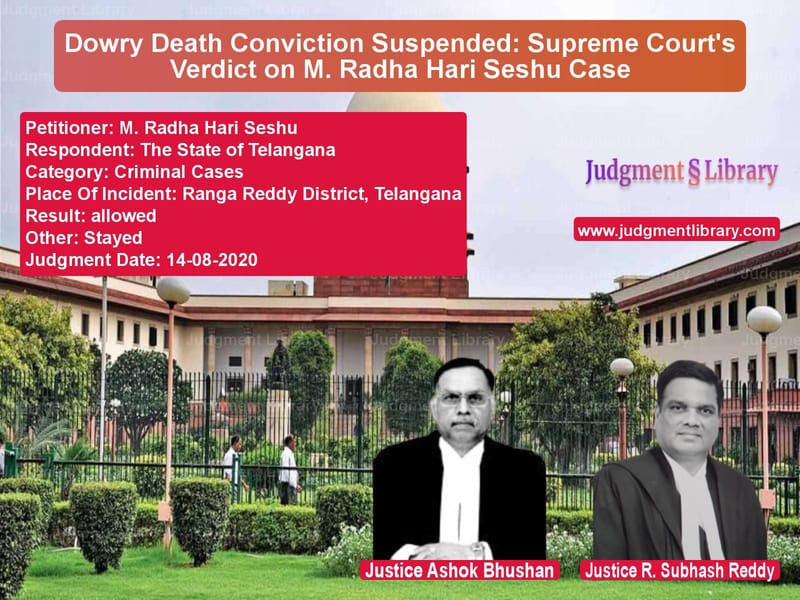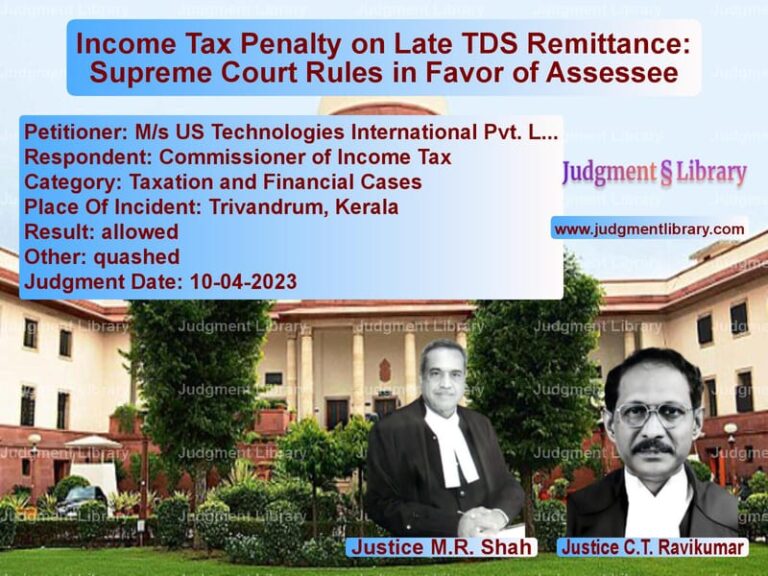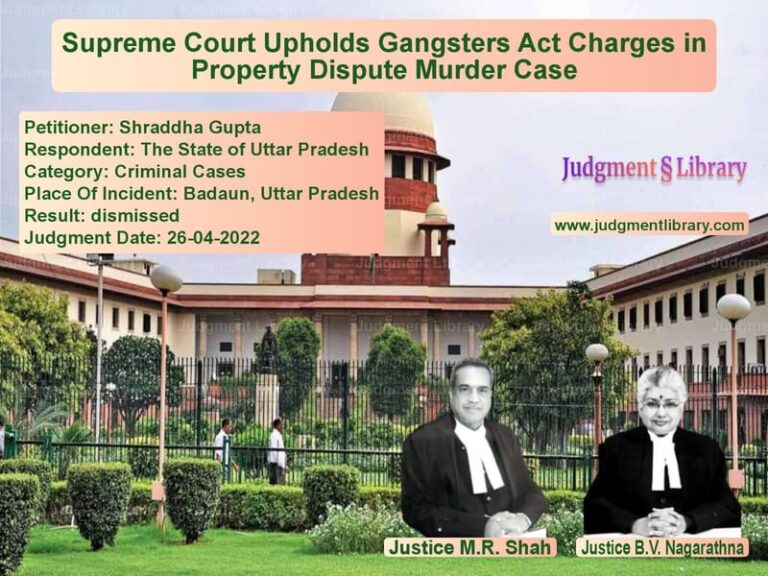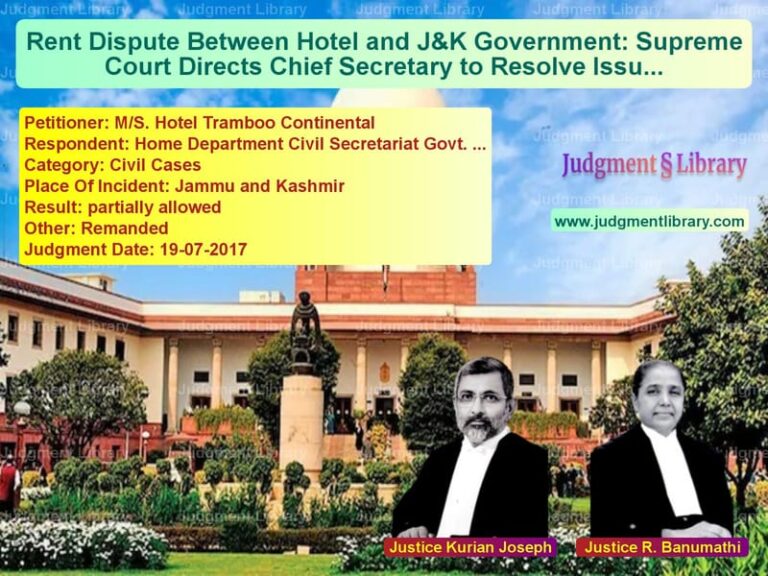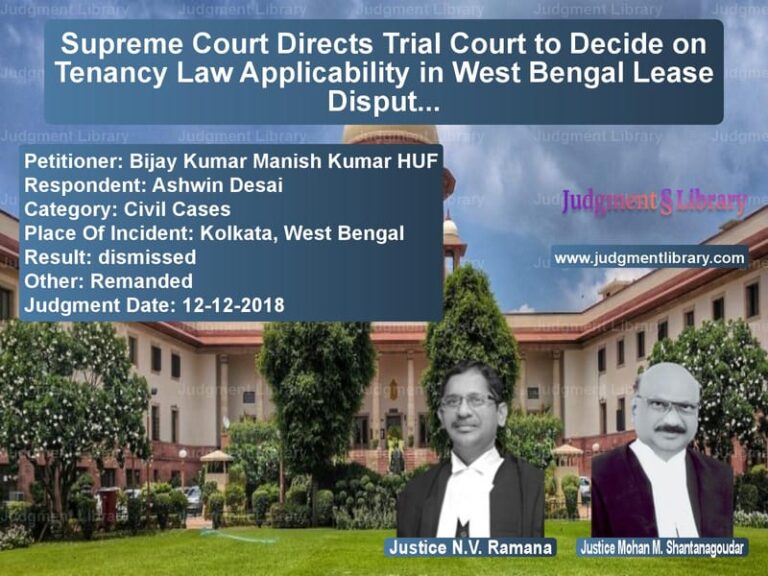Dowry Death Conviction Suspended: Supreme Court’s Verdict on M. Radha Hari Seshu Case
The Supreme Court of India, in its judgment dated August 14, 2020, reviewed the appeal of M. Radha Hari Seshu, who was convicted under Sections 304B and 498A of the Indian Penal Code (IPC) for the dowry death of his wife. The judgment dealt with the critical aspects of dowry-related offenses, legal interpretations, and the criteria for granting bail during the pendency of an appeal.
The case revolved around the tragic death of the appellant’s wife, leading to his conviction and sentencing to life imprisonment by the Sessions Court. The appellant’s plea for suspension of the sentence was rejected by the Telangana High Court, prompting him to approach the Supreme Court.
Background of the Case
The case originated with a complaint filed on December 7, 2011, against the appellant and his parents, accusing them of harassing the deceased for dowry. The police registered an FIR under Sections 498A, 304B, and 302 of the IPC at KPHB Police Station, Ranga Reddy District.
Following an investigation, a charge sheet was filed against the appellant and his parents for offenses under Sections 304B and 498A of IPC. The case was committed to the Court of Sessions, and upon trial, the learned III Additional District & Sessions Judge, Ranga Reddy District, L.B. Nagar, convicted the appellant under the said sections.
The appellant was sentenced to:
- Life imprisonment and a fine of Rs. 5,000 for the offense under Section 304B IPC.
- Three years imprisonment and a fine of Rs. 3,000 for the offense under Section 498A IPC.
The appellant’s parents, who were initially charged, were discharged from the case during the trial proceedings. Dissatisfied with the conviction, the appellant filed an appeal before the Telangana High Court, along with an application to suspend the sentence pending appeal. The High Court dismissed his application, prompting him to seek relief from the Supreme Court.
Petitioner’s Arguments
The appellant’s senior counsel, Sri R. Basant, argued that:
- The prosecution failed to prove the charges beyond a reasonable doubt.
- The evidence presented was misconstrued, leading to an erroneous conviction.
- The marriage between the appellant and the deceased took place in 2005, and they had two children. There was no history of ongoing harassment or cruelty.
- The case relied solely on the testimonies of interested witnesses—parents and a friend of the deceased—without any independent corroboration.
- There was no direct evidence to establish that the deceased was subjected to cruelty or harassment soon before her death, as required under Section 304B IPC.
- The trial court failed to scrutinize the evidence as per the legal principles laid down in Piara Singh & Ors. v. State of Punjab (1977).
- The High Court, while rejecting the bail plea, did not provide valid reasons for the same.
Respondent’s Arguments
The learned standing counsel for the State of Telangana countered the claims by stating:
- The trial court had rightly convicted the appellant based on the evidence and circumstances of the case.
- The testimonies of the deceased’s parents and close associates established that she was subjected to harassment.
- The High Court, in dismissing the bail plea, considered all relevant factors and recorded valid reasons.
Supreme Court’s Observations
The Supreme Court carefully examined the arguments and evidence presented. The key observations made by the bench were:
- The marriage between the appellant and the deceased had taken place in 2005, and they had been living together for several years before the incident.
- The appellant had been in jail since December 15, 2016, serving over three and a half years of his life sentence.
- The case was based on allegations of harassment, but there was no concrete evidence to prove that the cruelty was inflicted “soon before” the deceased’s death.
- The testimonies of the deceased’s parents and friends were classified as “interested witnesses,” which required careful scrutiny.
- The High Court had dismissed the application for suspension of sentence without adequately considering these factors.
Final Verdict
The Supreme Court allowed the appeal and set aside the Telangana High Court’s order, ruling that:
- The appellant’s sentence shall remain suspended during the pendency of his appeal before the High Court.
- The appellant shall be released on bail subject to conditions imposed by the trial court.
- The appellant shall not leave the country during the pendency of the appeal.
Impact of the Judgment
The ruling highlights crucial aspects of legal jurisprudence concerning dowry deaths:
- Presumption under Section 304B IPC: The judgment re-emphasizes that while the law presumes dowry death in certain cases, it is essential to establish that the cruelty or harassment occurred “soon before” the death.
- Independent Corroboration: Testimonies of interested witnesses, such as family members, need careful judicial scrutiny, especially in cases involving severe punishments.
- Fair Bail Consideration: The Court highlighted that bail applications must be evaluated based on the time already served and the possibility of miscarriage of justice.
By suspending the sentence and granting bail, the Supreme Court reinforced the principle that even in cases involving serious allegations, due process must be followed to ensure that justice is served fairly.
Petitioner Name: M. Radha Hari Seshu.Respondent Name: The State of Telangana.Judgment By: Justice Ashok Bhushan, Justice R. Subhash Reddy.Place Of Incident: Ranga Reddy District, Telangana.Judgment Date: 14-08-2020.
Don’t miss out on the full details! Download the complete judgment in PDF format below and gain valuable insights instantly!
Download Judgment: M. Radha Hari Seshu vs The State of Telanga Supreme Court of India Judgment Dated 14-08-2020.pdf
Direct Downlaod Judgment: Direct downlaod this Judgment
See all petitions in Bail and Anticipatory Bail
See all petitions in Dowry Cases
See all petitions in Attempt to Murder Cases
See all petitions in Judgment by Ashok Bhushan
See all petitions in Judgment by R. Subhash Reddy
See all petitions in allowed
See all petitions in Stayed
See all petitions in supreme court of India judgments August 2020
See all petitions in 2020 judgments
See all posts in Criminal Cases Category
See all allowed petitions in Criminal Cases Category
See all Dismissed petitions in Criminal Cases Category
See all partially allowed petitions in Criminal Cases Category

